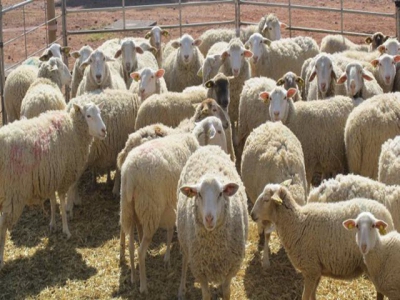New reproductive protocol for sheep uses natural hormones
New system also decreases the time during which sheep are exposed to exogenous reproductive hormones.
 Big data could help improve livestock resilience
Big data could help improve livestock resilience Automation in livestock farming so far has been limited to dairy cows and pigs, but new developments expected for laying hens, broilers, meat cows and fish.
 Lawley’s to boost efficiency, footprint with new feed additive production site
Lawley’s to boost efficiency, footprint with new feed additive production site Lawley’s Inc. is seeking to improve its support of dairy producers, along with its production efficiency and quality control with a new Texas-based
 Sheep with higher vitamin D levels give birth to heavier lambs
Sheep with higher vitamin D levels give birth to heavier lambs Researchers explore link between vitamin D levels and health and reproductive outcomes in sheep.
 Manure injection results in less phosphorus runoff
Manure injection results in less phosphorus runoff Research shows practice is compatible with no-till and doesn't increase sedimentation, but dairy farmers slow to adopt practice.
 Transporting cull dairy cows may change animal well-being
Transporting cull dairy cows may change animal well-being Transport of dairy cows to slaughter may result in deterioration of their clinical condition.
 Improved method for determining allele frequencies may aid genomic prediction
Improved method for determining allele frequencies may aid genomic prediction GLS method with sparse matrices is fast and highly accurate at estimating base generation allele frequencies.
 Dutch dairy sector comes in below phosphate reduction targets
Dutch dairy sector comes in below phosphate reduction targets In 2018, the stats showed that phosphate production in the Netherlands was down by 8.3m kg year-on-year, a decline by 5%.
 Healthy pastures may limit nitrous oxide effects from grazing cattle
Healthy pastures may limit nitrous oxide effects from grazing cattle When cow urine falls on degraded land, it releases more nitrous oxide than when absorbed by healthy pasture.
 New high-quality reference genome published for water buffalo
New high-quality reference genome published for water buffalo Water buffalo considered economically important livestock species around the world.
 Can lipid supplementation decrease enteric methane emission in dairy cows?
Can lipid supplementation decrease enteric methane emission in dairy cows? A team involving Chilean and UK based researchers tested the effects of including different fat sources in dairy cow diets in the form of unprocessed oilseeds
 US: Efficiency, production challenges drive new role for cattle grow yards
US: Efficiency, production challenges drive new role for cattle grow yards Interest in boosting efficiency in cattle production and labor challenges are changing the the role grow yards play for cattle feed yards, says industry analyst
 Study Beef's environmental impact lower than perceived
Study Beef's environmental impact lower than perceived New USDA study challenges widely reported assumptions about beef and carbon emissions.
 Cattle deaths prompt investigation, recall
Cattle deaths prompt investigation, recall Ongoing investigation into cattle deaths in Florida has not determined specific cause.
 Protein alternatives: The case for microalgae as soybean meal substitute in dairy cow
Protein alternatives: The case for microalgae as soybean meal substitute in dairy cow Finnish researchers have found similarities in the effect of including microalgae protein or soybean meal in dairy cow nutrition.
 Tropical legume forages may provide novel protein for dairy cow diets
Tropical legume forages may provide novel protein for dairy cow diets Tropical forage legumes may provide a cost-effective alternative to the use of soybean meal and sorghum silage in feeds for dairy cows, say researchers.
 Methane from cow burps could be lowered by a two-front approach
Methane from cow burps could be lowered by a two-front approach Combing a cow’s own genetics with strategies that target changes in her rumen flora may be able to reduce methane emissions more effectively
 How NIR technology can reduce variability in dairy feeds and hike milk yield
How NIR technology can reduce variability in dairy feeds and hike milk yield Miniaturizing NIR technology improves its utility and brings dairy producers closer to having daily feed assessments and improved corrections of feed variabilit
 Study measures feed efficiency in forage-, grain-fed cattle
Study measures feed efficiency in forage-, grain-fed cattle Results show accurate feed efficiency measures can be obtained in growing and finishing periods
 Feeding baby calves in winter a chilly proposition
Feeding baby calves in winter a chilly proposition During the short days and long nights of winter, big changes can happen quickly for baby calves. Increase liquid nutrients to help calves keep growing through
